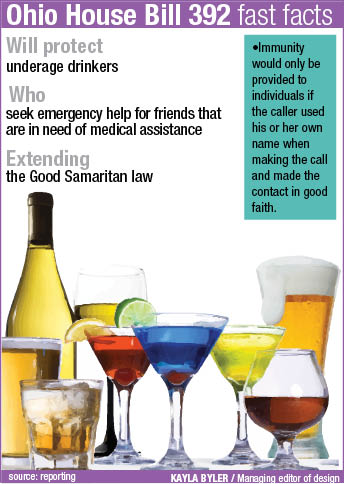The Good Samaritan law might expand to underage drinkers seeking medical assistance for intoxicated friends under the newly proposed Ohio House Bill 392, which is set to hold its first proponent testimony hearing this week.
Ohio Rep. Michael Stinziano, D-Columbus, has proposed legislation with the help of the bill’s cosponsor, Ohio Rep. Cliff Rosenberger, R-Clarksville, that would protect underage drinkers who seek emergency help for others who are in need of medical assistance.
“The legislation is a bill that would allow Good Samaritans who recognize alcohol poisoning or a colleague that is risking a health scenario because of alcohol consumption not to be prosecuted if they too were underage drinking if they seek medical attention for their friend,” Stinziano said.
Ohio State’s Student Conduct already considers circumstances that would fall under the new House Bill 392 when reviewing cases, Office of Student Life spokesman Dave Isaacs said.
“The safety and security of our students are our primary priorities. We applaud efforts that encourage our campus community members to demonstrate care and concern for the health and well-being of others,” Isaacs said.
Steven Dearwester, a second-year in business administration, was at a party recently with a few of his friends when one of them began exhibiting signs of alcohol poisoning.
“He just wasn’t responding and in the end, we laid him down and just kind of watched him through the night,” Dearwester said. “It was scary.”
Dearwester and his friends, though, did not seek emergency assistance because they were underage, he said.
“(The new bill) would be beneficial to students who are underage to be able to seek help and not face any backlash or consequences for it,” Dearwester said.
OSU’s Undergraduate Student Government released a statement Jan. 14 that said it supported Ohio House Bill 392 that would “create an Under-21 Alcohol Good Samaritan policy across the state of Ohio.”
The policy would allow people under the legal age of consumption to contact emergency services if needed without the fear of repercussions or incrimination.
“This Good Samaritan policy will create an environment that encourages students to call for help and make safe and smart decisions. USG supports Good Samaritan policies for Ohio State’s campus and off-campus areas as well as at universities throughout the state of Ohio,” the USG statement read.
Statistics have shown that in states that lack the policy proposed in this bill, calls occur less frequently, Stinziano said.
“When there is awareness and a medical amnesty policy, individuals are two and a half times more likely to call because they no longer fear disciplinary action,” Stinziano said.
Molly Hagerty, managing director of Student Legal Services at OSU, said nearly half of the matters advised by Student Legal Services in 2012-13 were in some way alcohol-related.
People under the age of 21 are not permitted to buy or consume alcohol in Ohio and face a misdemeanor of the first degree if they violate that law, according to the Ohio Revised Code. A misdemeanor of the first degree can result in up to six months in jail and/or a fine between $500 and $1,000.
Hagerty said Student Legal Services supports the proposed legislation.
“We think that it is important in order to assist students, particularly those students who have made some unwise choices for themselves, to allow them to learn from those mistakes as opposed to watching someone who has overdosed be killed or otherwise harmed,” Hagerty said. “Our ultimate mission is to assist students in those matters that impede their academic success.”
Currently, 19 states, including Indiana, Kentucky and Florida, have laws in place that provide limited criminal immunity for the individuals seeking medical assistance for intoxicated friends, according to a release on Stinziano’s website.



